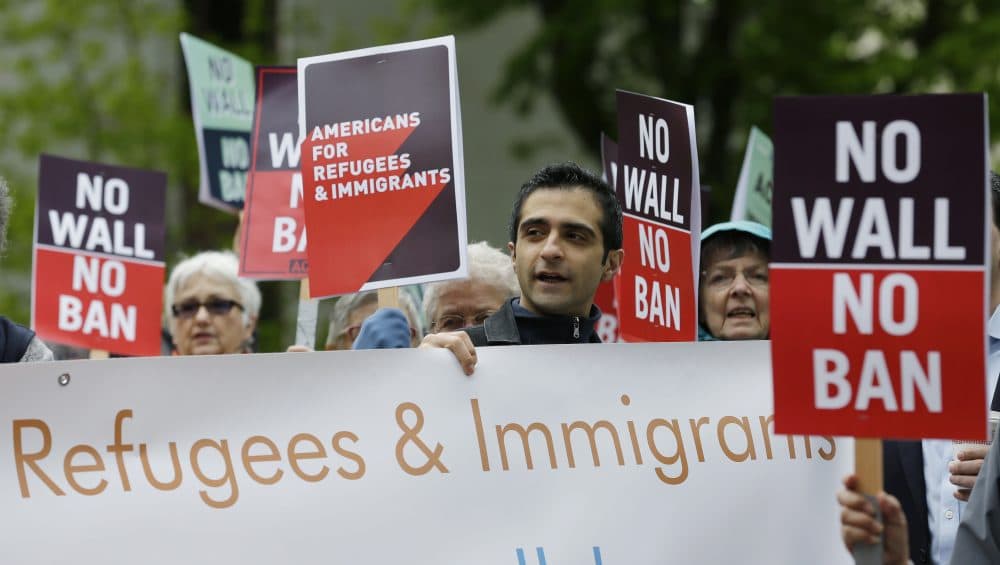Advertisement
'Need Some Clarity Soon': Anxieties Rise For Some After High Court Partially Revives Trump Travel Ban
Resume
Many refugees and immigrants from six majority-Muslim nations who have been looking to settle in Massachusetts — or any other part of the United States — have just two days to get here. That's after the Supreme Court on Monday revived portions of President Trump's temporary travel ban, at least until the full court reviews the ban in the fall.
Refugee advocates in Massachusetts say they are trying to figure out what to do next as the court said some people are exempt from the ban. But it is unclear just who qualifies as an exception.
'Immigrants Are Anxious'
For Abdi Yusuf, there's a simple word that describes the feelings not just of his own Somali community, but of all immigrants: angst.
"Of course they're anxious," Yusuf said. "Yeah, all immigrants are anxious. Absolutely. This is a departure from the U.S. tradition of welcoming refugees and immigrants."
Yusuf is head of the Somali Development Corporation. It's an agency in Roxbury that helps resettle refugees from the small East African nation. Somali is one of the six mostly-Muslim nations — the others are Syria, Iran, Libya, Sudan and Yemen — whose citizens will now likely be blocked from entering the U.S. for 90 days.
President Trump also wants to suspend the entire American refugee program for 120 days. Yusuf says it's hard to find answers for local Somalis worried about the fate of their relatives in refugee camps.
"What can you say? You just have to wait and see and hope that Donald Trump will find whatever he's looking for," he said.
What Trump says he's looking for are ways to improve the vetting process for those who want to enter the U.S.
Lower courts had blocked Trump's executive order earlier this year, but the Supreme Court is now allowing part of it to proceed with an important exemption: those who already have a "relationship with a person or entity in the U.S."
Some say the ban could hurt the Massachusetts economy. But that's debatable.
"It does affect Massachusetts because of the world-class universities and hospitals and corporations that are operating here," said Jessica Vaughan, with the Center for Immigration Studies, a Washington-based group that supports tighter controls on immigration.
But she says the travel ban will provide greater benefits in the long run.
"The reality is that when our immigration system becomes safe because we do better vetting, that's going to benefit the commonwealth of Massachusetts also," Vaughan argued.
Ban Reinstatement Is 'Still Very Confusing'
Some advocates for refugees say the American vetting process is among the strongest in the world. Jeffrey Thielman, of the International Institute of New England, is one of them. He spent much of Monday trying to figure out just who will be exempt from the travel ban.
"I guess if you have a brother or a sister or a parent in the country, then maybe you're in," he said. "So it's still very confusing, and we're going to need some clarity soon."
Thielman's group resettles hundreds of immigrants annually from countries including those under the temporary travel ban. He says the organization is hoping the relationship it has with refugees meets the standard set by the Supreme Court, but how that standard is interpreted is up to the Trump administration.
Massachusetts takes in roughly 2,400 people each year, including refugees, asylum-seekers and human trafficking victims. The state Office for Refugees and Immigrants says that number is expected to decrease by about 25 percent in the coming fiscal year.
"We're going to have fewer refugees than we've had in the past several years," Thielman said. "And that's going to be a sad thing, because we're a place that welcomes refugees.
"And the refugees who come here get into the workforce pretty quickly, and they fill jobs that people need to have filled here."
Thielman added that you can't grow the economy without immigration. Although the travel ban might not have much impact because of the small numbers, he says it sends a message that people aren't welcome.
In the meantime, his group has just two days to respond before the ban goes into effect.
This segment aired on June 27, 2017.
